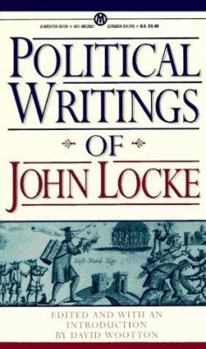Political Writings
Select Format
Select Condition 
Book Overview
John Locke's Second Treatise of Government (c. 1681) is perhaps the key founding liberal text. A Letter Concerning Toleration , written in 1685 (a year when a Catholic monarch came to the throne of... This description may be from another edition of this product.
Format:Mass Market Paperback
Language:English
ISBN:0451628616
ISBN13:9780451628619
Release Date:August 1993
Publisher:Berkley
Length:480 Pages
Weight:0.55 lbs.
Dimensions:7.0" x 1.3" x 4.3"
Customer Reviews
2 ratings
A 'modern' man of the late 17th century
Published by Thriftbooks.com User , 14 years ago
Once I became used to the very long sentences I found this book a delight. In 21st century England we have long been used to religion being confined to the personal sphere, notwithstanding the Lords Spiritual, the Queen as Head of the Church and a tiny, disaffected minority that would see our country take its place in a Global Caliphate. In both his Treatises on Government, as well as in his Essay on Toleration, Locke seeks to demolish many barriers, then still standing, against freedom of custom in forms of worship and freedom of conscience in belief. Such was the atmosphere in the late 17th century. The place of God in our Constitution had been a crucial issue in the blood soaked Civil War which had been the backdrop to Locke's childhood. He was sixteen years old when the Prot./Cat. Thirty Years War drew to a close. Locke's burial of the notion of the divine right of kings, and his acknowledgement that rulers can only rule legitimately with their people's consent may make him sound like a pioneer of liberalism, or even a visionary of our modern age. He is, however, very much a man of his time. Indeed that is the attraction of this book. The comments of a 17th century man from a 17th century perspective bring the period to life in a way that would tax the skills of a 21st century historian. Consciously or no, historians will have their own agenda. 'Liberal' is a relative term. Locke would outlaw atheists; he was convinced that morality was impossible without a belief on God. 'Mahomedans', whose loyalty would, with their essentially political faith, be to the Ottoman Sultan and Caliph, could not possibly be subjects of the English crown. Regarding the early development of human societies, polities and nations, Locke was writing prior to the development of anthropology and sociology, and 200 years befroe Darwin wrote 'The Descent of Man'. His conjectures, therefore, on primitive societies, appear, quite naturally 'primitive'. In other ways Locke appears prescient. One hundred years before Adam Smith he attempts an explanation of the laws of supply and demand. 200 years before Marx he outlines his own 'labour theory of value'. He proposes what we would now call 'workhouses' as a a remedy for beggary and paupery. His grand scheme for eradicating poverty might read, at first sight, like an early version of Thomas Paine's 'Rights of Man'. Unlike Paine, however, who envisioned a state education system providing universal literacy, Locke would have the poor children set to work in the textile industry. And finally; for South Carolina he proposed a constitution definitely aristocratic, if not feudal, and for England he recommends that the Act of Queen Elizabeth's day whereby unlicensed beggars would have their ears cut off, should be enforced with full rigour. The seeds of modern England can be seen in this selection of Locke's writings, but whatever his influence, our country has changed in ways that Locke would find inconceivable.
The basis of civil government
Published by Thriftbooks.com User , 24 years ago
This compilation of Locke's political writings not only contains his famed second treatise, but also suplementary essays supporting his views and espousing other particulars. The book is a must for any one interested in political philosophy in the least simply because most of the ideas espoused were incorparated into the foundation of our country. The essays set up locke's basic democratic theories and his version of social contract society. the reading is mildly technical and archaic, but not too bad. an excellent start to any one interested in philosophy






